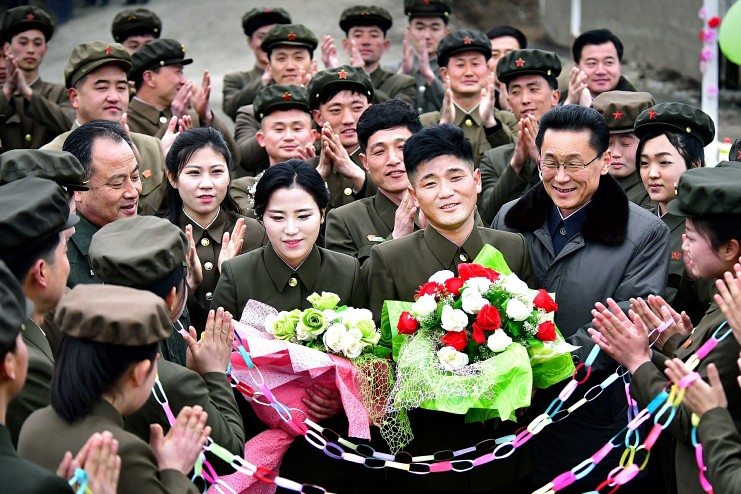Editor’s Note: In Sep. 2021, North Korea’s Supreme People’s Assembly adopted the “Youth Education Guarantee Act,” one of the “big three” oppressive laws passed during the COVID-19 period. The law concretely defines a number of behaviors that young people must not engage in and obligates the government to control and crack down on these behaviors. Is this issue of youth education so grave that legal remedies are truly necessary? To find out, Daily NK investigates how the lifestyles and ways of thinking among the “MZ generation” (those born in the early 1980s-early 2000s) compare to previous generations of North Koreans.
According to the Ministry of Unification’s “North Korea’s Economy and Society: Realities and Resident’s Perceptions Report” published in February, the average age of marriage for North Korean women has risen from 24.6 to 25.9 years of age, a 1.3 year increase.
Among the 1,005 survey respondents who had defected prior to 2011, 66.8% reported that they had married before the age of 25, while only 3% reported marrying after the age of 30. By contrast, among those who defected after 2012 (1,427 respondents), the number of respondents who had married by age 25 fell to just 51.3% while the proportion who had married after 30 rose to 14.2%.
With women now heavily burdened with the responsibility for household finances, the report found that North Korean women are increasingly preferring to marry later in life, when possible.
The report also found that members of the “MZ generation” (those born between the early 1980s to 2000s) had more passive attitudes regarding dating and marriage. The economic hardships brought on by COVID-19 appear to be accelerating this pivot away from marriage.
“It’s 100 times better to not get married in the first place”
Daily NK spoke with three young North Korean residents, all in their thirties, to share their views on dating and marriage.
The young resident of Sinuiju, North Pyongan Province, told Daily NK that “getting married seems like a huge burden, so the people around me – myself included – think that dating is fine, but you shouldn’t get married.”
The individual also pointed out that while buying a birthday or anniversary gift for a romantic partner was not a major problem, marriage involves buying a house, food, and other necessities of life and becomes a significant financial burden.
“It’s common for people to get married because they like each other, only to end up constantly fighting due to financial difficulties, and sometimes they even divorce [because of the stress],” the Sinuiju resident explained. “When you’re having a hard time economically, marriage is just the start of [new] suffering, so [I] think it’s 100 times better to not get married in the first place.”
A resident of Chongjin, North Hamgyong Province, echoed this sentiment, adding “women are more inclined than men to want to avoid marriage. Women have to earn money and provide for their families, as well as make food, do the dishes, do the laundry, and handle other chores, so [many women] see marriage as a source of misery rather than a source of happiness.”
Not even reprimand from Kim Jong Un can convince young people to stop avoiding marriage
This anti-marriage trend is directly linked to the drop in North Korea’s birth rate.
According to the “2022 State of World Population Report” published by the United Nations Population Fund (UNFPA) in March 2022, the total fertility rate (TFR, the average number of infants a woman is expected to birth over her lifetime) for the average North Korean woman was estimated at 1.9 per woman, falling short of the replacement rate of 2.1 needed to sustain the country’s population.
In order to address the country’s long standing low birth rate issues, North Korea implements preferential policies favoring women who have multiple children and has adopted various laws related to childrearing. At the end of 2023, Kim Jong Un even convened the “Fifth National Conference of Mothers,” where he directly mentioned falling birth rates and encouraged women to have multiple children. Yet, these efforts have failed to move the hearts of young North Koreans.
The young Sinuiju resident explained that “with everyone tightening their belts, [parents] are responsible for every little thing involved from birthing to raising their child, so you need money just to give birth to a kid. [North Korea] has now become a world where you can’t survive without money. In the past, I had thought about having a child and raising them so that they’d want for nothing, but now, the way I see it, I shouldn’t bring a child into a world where they’ll [just] suffer.”
The young respondent from Chongjin made a similar argument, saying: “If you are living well, who wouldn’t get married and have a kid? [Now] it is getting harder and harder to put food on the table, and if you don’t have money, you can’t send your child to school or kindergarten, so [many people] can’t even dream of having a kid.”
The third interviewee, a resident of Hyesan, Yanggang Province, said that “I often found myself blaming my parents, wondering why they gave birth to me when they couldn’t take responsibility [for my well being.] I can’t express in words what it felt like to finish my military service only to get sent off to work in the mines because I came from a poor household. This sort of life [that I have lived] has made me believe that if I don’t have the ability to marry and take good care of my child, then I shouldn’t even have a child in the first place.”
The common cause behind low birth and marriage rates: economic hardship
All of the young North Koreans that Daily NK spoke with agreed that the young people’s reluctance to get married and have children stem from the struggle to make ends meet.
“Even up until COVID, it wasn’t especially hard to get by, and you could even put together some savings. But now it’s hard to make money and you’re lucky to eat two meals a day. So, fewer people are marrying and having kids. The only way to change the way [young] people think [about marriage and children] is to first resolve the issue of basic survival,” the young Sinuiju resident pointed out.
“In the past, if you didn’t marry, people would mock you and call you an ‘old maid’ or an ‘old bachelor,’ but now the ones being laughed at are the people struggling to get by with their kids strapped to their backs. Among my generation in particular, there’s a growing determination to not spend our lives, already full of hardship, working ourselves to the bone to raise children and provide for a family,” the Hyesan resident explained.
“It’s incorrect to think that the new generation has the same ‘when they say jump, ask how high’ attitude of our parents. Encouraging people to have children without putting forth any policies or practical measures to help resolve problems of basic survival will only further close young people’s hearts [to the regime].”
Translated by Rose Adams. Edited by Robert Lauler.
Daily NK works with a network of sources living in North Korea, China, and elsewhere. Their identities remain anonymous for security reasons. For more information about Daily NK’s network of reporting partners and information-gathering activities, please visit our FAQ page here.
Please send any comments or questions about this article to dailynkenglish@uni-media.net.


















